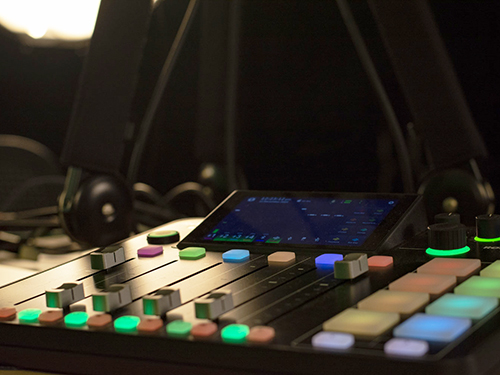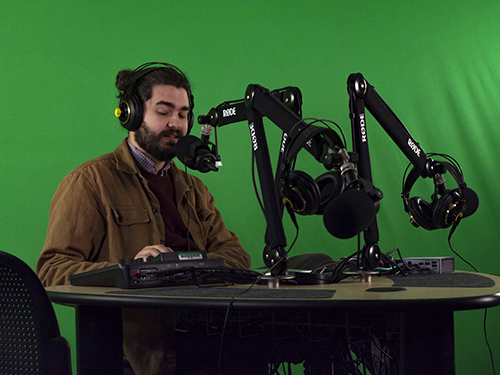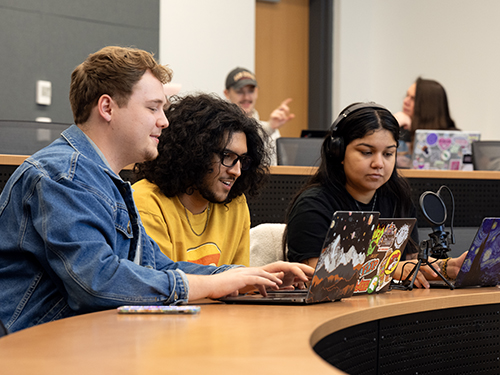
DENTON (UNT), Texas — The popularity of podcasts is on the rise among listeners worldwide. At the University of North Texas, students are using this medium to develop career skills and share their research or areas of study with broad audiences.
“I liken podcasting to sharing stories around a campfire — it’s an engaging way to connect with those who learn through listening,” said Jerry Johnson, a junior theatre major with a minor in Japanese. “While some may prefer visual learning, the relatability of audio-style learning in podcasting allows you to just settle in and enjoy.”
Johnson is the primary host for the “UNT MindSpark” podcast, which is affiliated with The Spark makerspace in Willis Library. The show highlights the maker movement, a tech subculture blending arts and crafts with engineering activities like 3D printing and robotics.
“We actively invite guests, especially from makerspaces nationwide, to learn from their diverse ideologies,” Johnson said. “Our goal is to share a variety of experiences, believing that even for those not interested in making, that listening to human experiences and others’ passions can grip anyone’s spirit without fail.”
On campus, facilities like The Spark and the Soundbox Music Technology Lab offer podcasting equipment for students and staff to borrow. Microphones and other audio gear can be borrowed from both places. The Soundbox staff is on hand to provide training on audio recording and digital audio workstations.
Additionally, those interested can receive training on equipment and audiovisual editing software at The Spark. They can also reserve recording booths in Willis Library or an AV room at Frisco Landing for recording and producing shows.
“UNT offers excellent resources, spaces and curriculum for students to practice podcasting and potentially build a career if they refine their skills,” said Brittany McElroy, a senior lecturer from the Mayborn School of Journalism. “Quality content is crucial for podcast success.”
UNT students can take podcasting courses offered by the Mayborn School and the Department of Media Arts to learn skills such as scripting, recording, editing and distribution. McElroy developed a podcasting course for the Mayborn School with a focus on accessibility.
“Podcasting is great because the cost of entry is low,” McElroy said. “The medium really provides a way for students to experiment and get hands-on experience.”

Mayborn School students can access a new podcasting studio in Chilton Hall, which includes three microphones, cameras, a one-button mixing board for live recording with sound effects and a green screen for filming sessions. The space is operated by Deane Marshall, media technical manager for the school.
“It’s important to immerse students in the environments they’ll be operating in for their careers,” Marshall said. “Recruiters in media and broadcasting often highlight the value of students who engage with studio spaces early in their college careers, noting that they tend to be among the best employees.”
As media arts and journalism students integrate podcasting into their coursework, other UNT students across various academic disciplines are incorporating this medium into their learning experiences.
Wesley Phelps, an associate professor and director of undergraduate studies in UNT’s Department of History, tasked students in his Texas LGBTQ History class with creating a podcast as a capstone project.
“I wanted them to think about how we translate academic history to a general audience and how we talk to people outside of our field,” Phelps said.

His students created a six-part podcast series titled “Out in Oak Lawn: A Queer History of Dallas,” which explores the history of a Dallas neighborhood known for its LGBTQ-owned businesses, culture and community.
Students worked in teams to write, produce and edit the episodes. They conducted their own research and interviews, studying archival recordings and learning to interpret primary documents.
“I think podcasting is a way to make this information more accessible,” said Gabriela Whitmore, a sophomore majoring in history and minoring in Spanish. “People who may not know anything about the Oak Lawn neighborhood can listen to our podcast.”
From history to topics in business and STEM, Durga Srikari, a master’s student in information systems and technologies, educates others about cybersecurity through her podcast “Cyber Trooper.”
Drawing on her expertise as a cybersecurity specialist, Srikari invites industry professionals to discuss risk management, endpoint protection and other topics, providing valuable information and career advice for those interested in joining the field.
“I get a lot of questions from other students about what courses to take and what certifications they need,” Srikari said. “So, I thought getting answers from industry experts could help university students and new graduates.”
Judy Hunter, director of The Spark, emphasizes the potential of podcasts to extend the reach of research and interests beyond conventional boundaries.
“Podcasts can help connect to audiences that may not otherwise engage with the research or a topic,” Hunter said. “UNT students are not only learning valuable skills, they're also leveraging podcasts as a creative outlet to share their studies and explore personal passions. This educational tool serves as a platform for innovative learning and support."